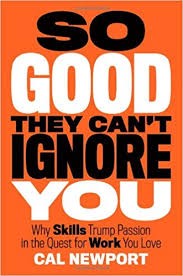So Good They Can’t Ignore You

Cal Newport is a Computer Science professor at Georgetown University who happens to write amazing books on the side (or vice versa.) This week and the next, I’ll revisit two of his books — So Good They Can’t Ignore You and Deep Work. I read them back in early 2016 and was surprised to find so many nuggets of practical wisdom around choosing a career and doing meaningful work. Onto the review:
As with most non-fiction books, the number of new ideas in this book are few and far between. I feel what makes this book a great read is the examples that illustrate the ideas — every author brings their own experience, and how the same ideas apply to their field and the field adjacent to theirs. That out of the way, Cal Newport prescribes four rules for picking a fulfilling career:
Rule #1: Don’t follow your passion
This is the central piece of advice of the book. Not only are pre-existing passions extremely rare, they’re borderline mythical. People become passionate about whatever they choose to become good at. Passion is a consequence of competence; of attaining excellence in a field. Thus, the age-old adage “Follow your passion” should be updated to “Become a craftsman to collect rare and valuable skills you need”.
Being satisfied with work is connected to passion, which in turn is connected to intrinsic motivation. Three important components of intrinsic motivation are autonomy, competence and relatedness. You should feel you have some sense of control over your time, that you’re good at what you do, and finally, you should be able to relate to others in the process.
Rule #2: Be so good that they can’t ignore you
In this part, Cal Newport introduces what he calls career capital theory, which says that you first build up rare and valuable skills and then use these skills as leverage to shape your career into something you love.
Deliberate practice is the way to develop the autonomy and competence you need to boost your intrinsic motivation levels. Deliberate practice aims to take on tasks that are challenging just enough that you stay fully engaged and get to a state of flow¹, but not so hard that you give up in frustration. You want to become a craftsman shooting for problems that are almost solvable by you. This process of constantly getting better is how you master your field, and that skillfulness is the reason why you’ll end up loving your work.
Rule #3: Turn down a promotion (or, the importance of control)
Over time, you would be offered more and more responsibility until one day you’ll find yourself in a new job that doesn’t let you practice your craft any more. Cal Newport argues that it’s okay to turn down a promotion to maintain control and autonomy over your life. If you’ve worked long and hard to get to point where you love your work, it’s rarely worth trading it away for a little more money.
Rule #4: Think small, act big (or, the importance of mission)
You need rare and valuable skills before you can identify a powerful mission. But once you’ve acquired those through deliberate practice, figure out what your career-defining mission is — this will become the source of your passion.
Some personal notes about the book:
- ¹ The concept of deliberate practice refers to the state of flow a lot, which was introduced in the Flow book by Mihaly Csikszentmihalyi (link). It has been on my reading list for far too long.
- This book’s title is the famous Steve Martin quote, “Be So Good That They Cannot Ignore You”. When asked for advice for up and coming young comedians, this is what Steve had to offer. I read his autobiography Born Standing Up (link) in 2014, followed by an exhaustive YouTube binge of every stand-up act of his I could find. He easily remains amongst my favorite top 3 comedians of all time.
- Tim Urban recently explored the topic of picking a career in depth. As always, he gives you helpful mental models to think through this important topic: https://waitbutwhy.com/2018/04/picking-career.html
- I’m currently reading How Will You Measure Your Life by Clayton M. Christensen (link). Similar ideas around picking a fulfilling career, rehashed all over again from the perspective of an HBS professor who’s credited with inventing the theory of disruption in his earlier book The Innovator’s Dilemma (link).
This concludes my short review of this book. Next week, I’ll review Cal’s other book I’ve read: Deep Work. Happy Sunday!
This is #16 in a series of book reviews published weekly on this site.
